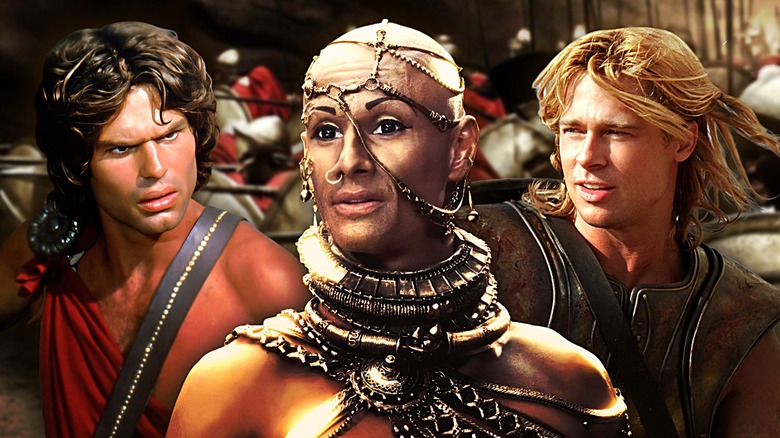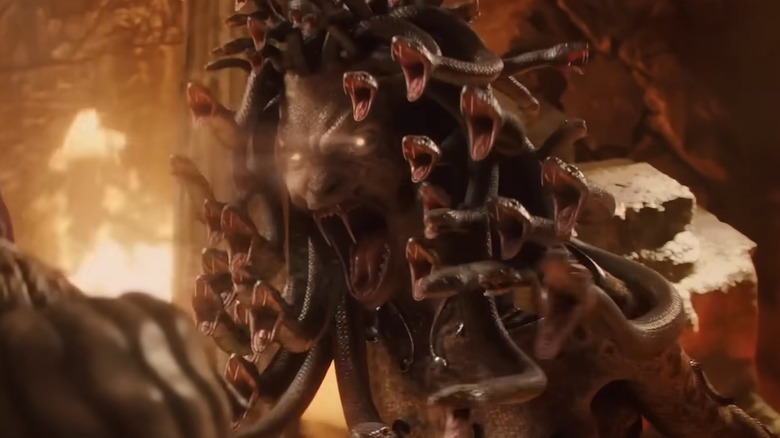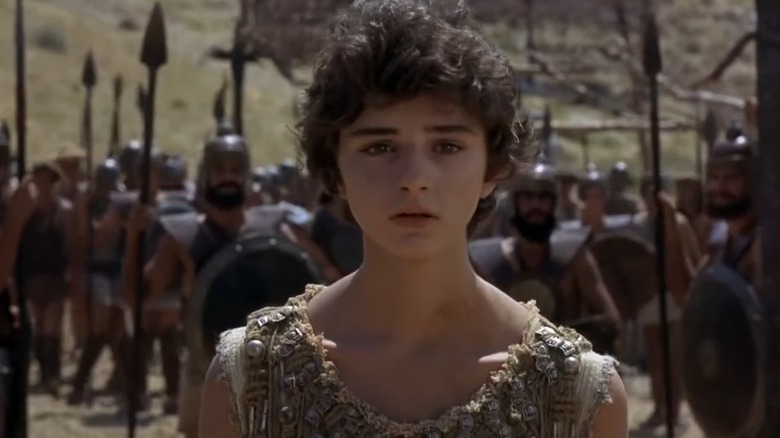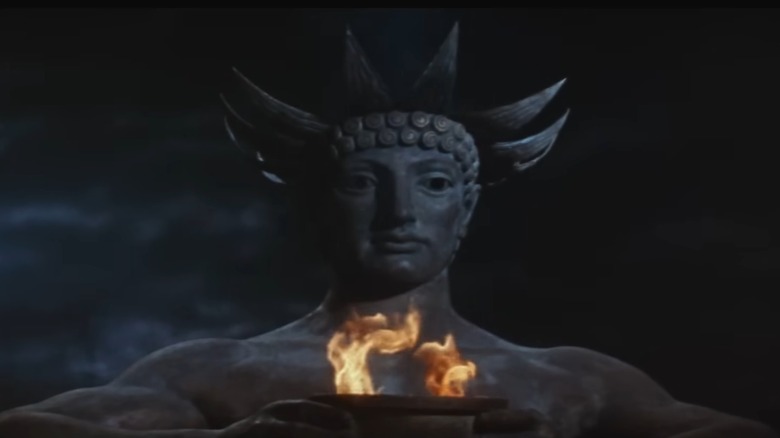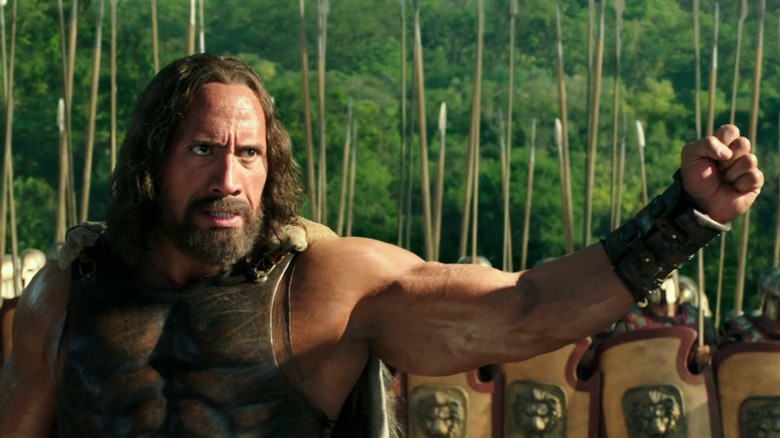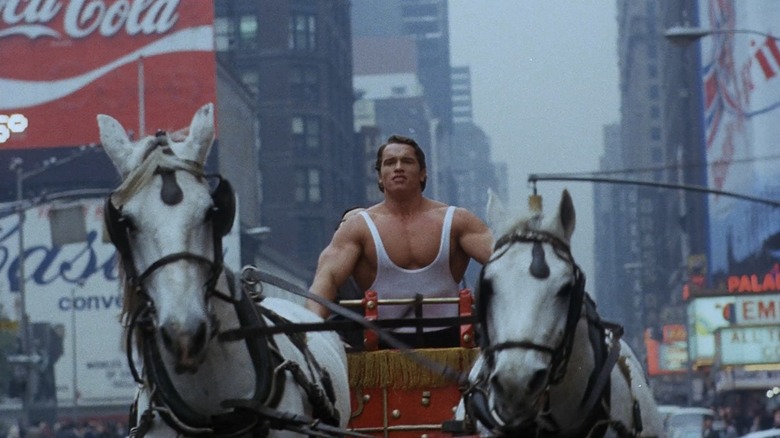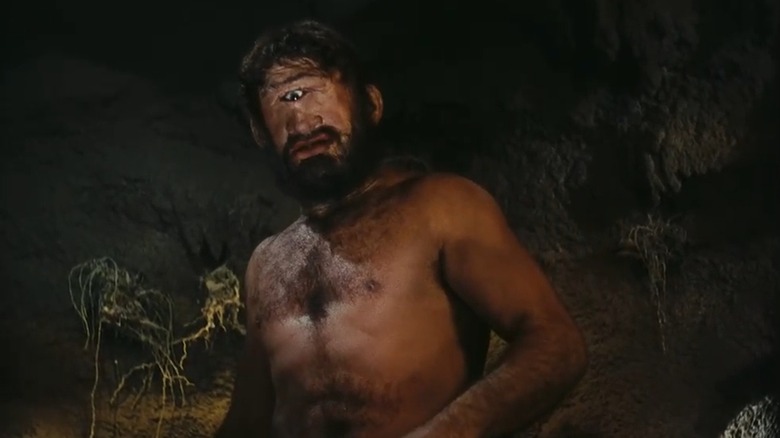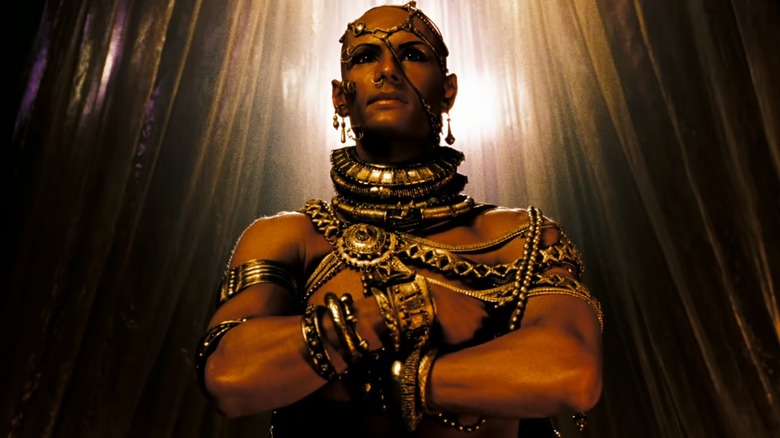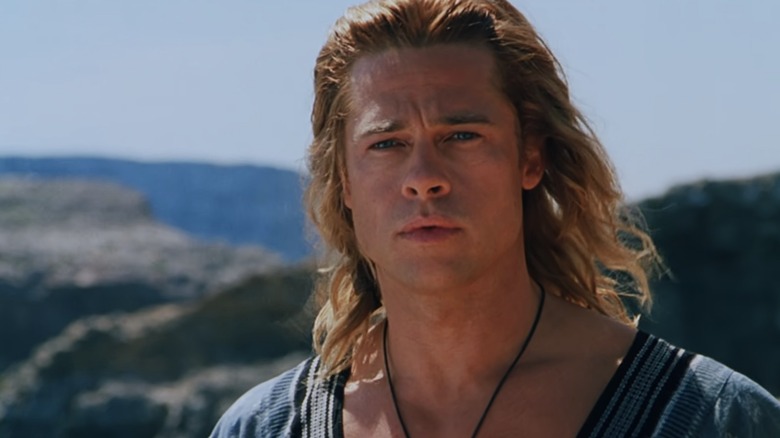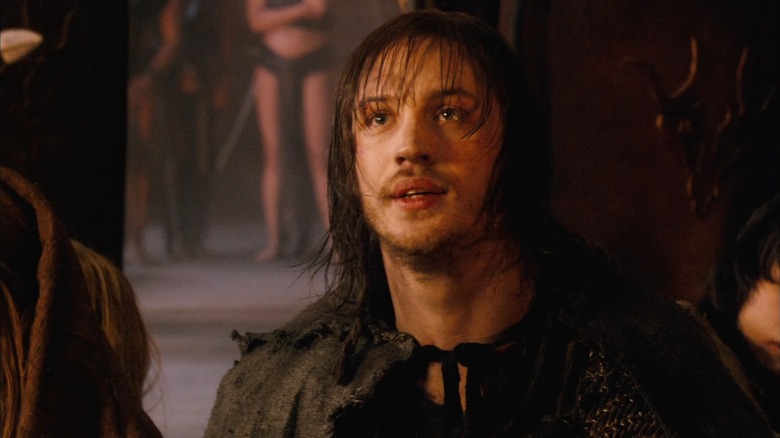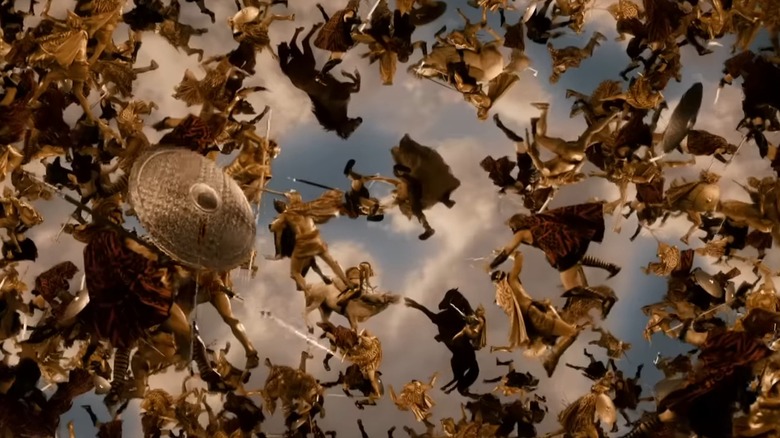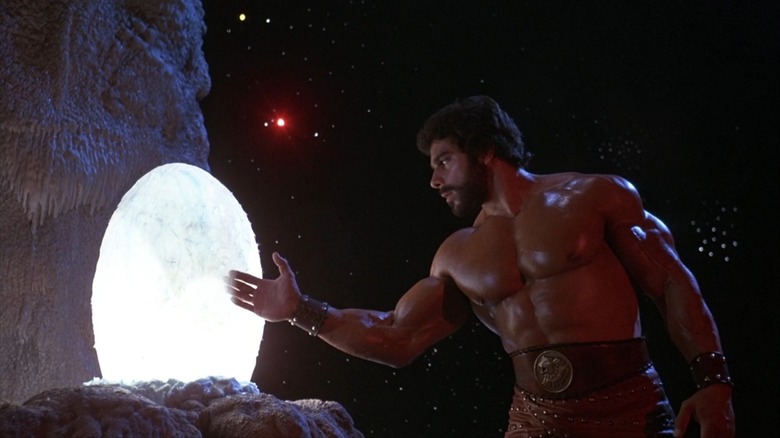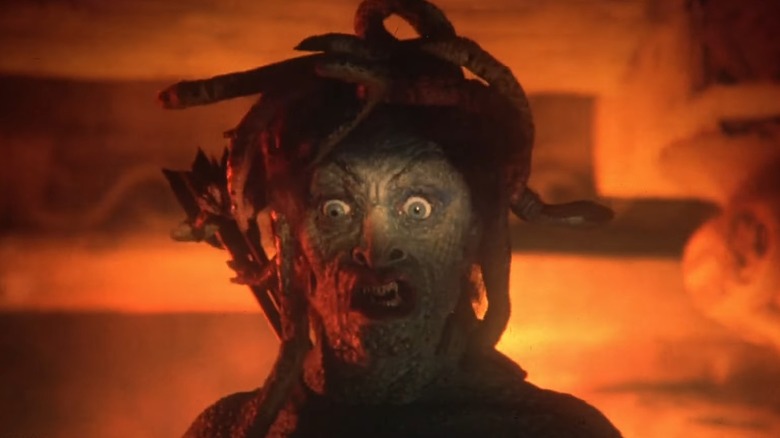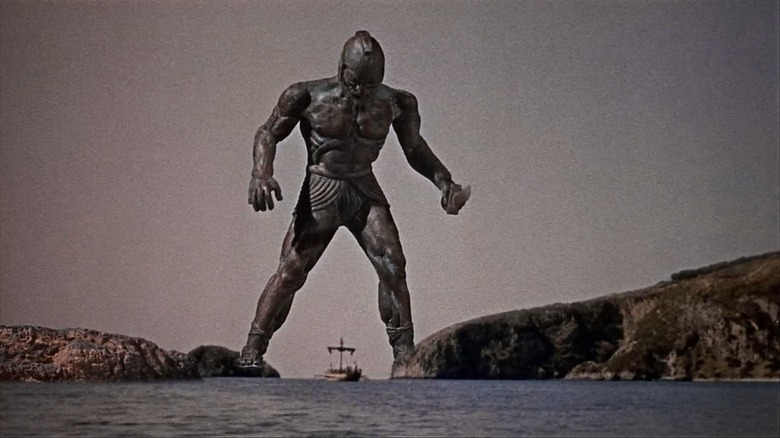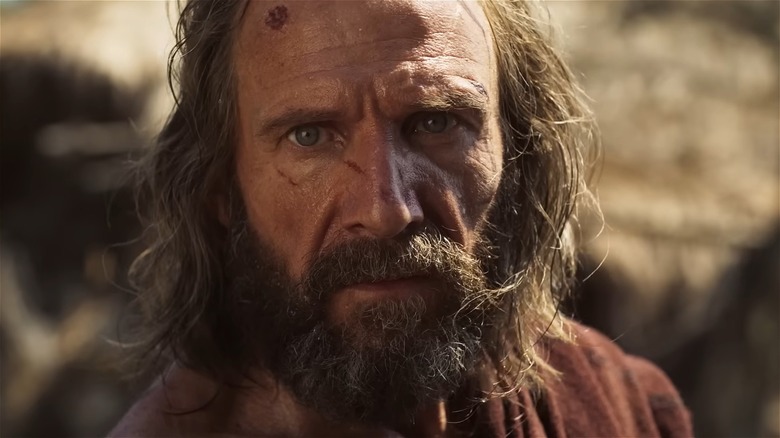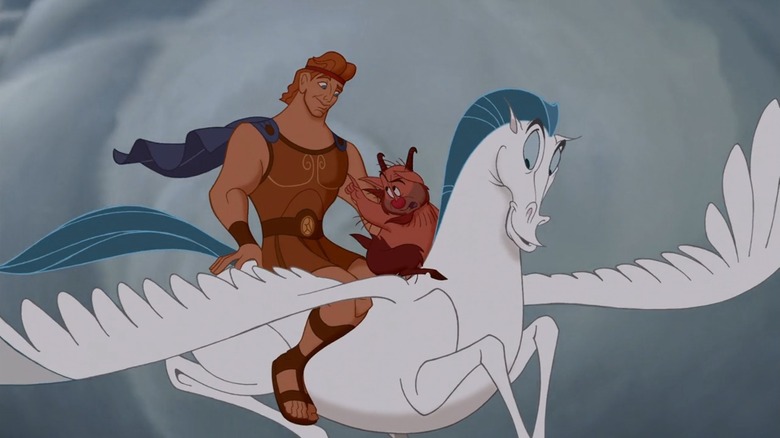The 15 Best Greek Mythology Movies, Ranked
I recently saw a friend in a play about Robin Hood. They performed on a small outdoor stage in the middle of a park, acting with minimal sets and costumes. Still, it was an engaging, funny play, and it even made me a little verklempt to think about the fact that humans have been dressing up in parks to tell each other stories of Robin Hood for hundreds of years. We like to entertain each other, and I think that's neat.
The same goes for Greek mythology. These stories have circulated for millennia, used as moral lessons or to simply pass the time. There's a vast amount of mythology to dive into, but at least in the world of cinema, we tend to tell each other the same few stories over and over again, dressing up in costumes to act out the adventures of Hercules, the trials of Odysseus, or the showdown between Theseus and the Minotaur. The movies on this list vary in quality, but the tales they tell still resonate, striking something primal within us that makes us want to entertain each other. I just think that's neat.
Clash of the Titans (2010)
Sam Worthington, bless him, probably thought he was on a rocketship to the A-list when "Clash of the Titans" premiered a few months after "Avatar." Unfortunately, while Louis Leterrier's big-budget CGI-fest made a ton of money, Worthington didn't exactly prove himself as a capable leading man. His performance as Perseus is quite wooden, and he stumbles through without a glimmer of interiority.
In retrospect, this remake was probably a warning sign of Hollywood sludge to come. It's ugly, with most of the colors washed out in a way that now seems all too familiar. Look no further than the film's "costumes" for proof of what a shaky experience this is: Ralph Fiennes plays Hades, an evil god who floats around draped in CGI smoke, while Liam Neeson's Zeus seems to be dressed in lens flares.
Still, it's not unwatchable. It's basically 90 minutes without credits, which is merciful, and the film's big fight against Medusa provides a glimmer of fun. Plus, enjoyable supporting turns from Gemma Arterton, Nicholas Hoult, and especially Mads Mikkelsen round out the cast. Sam Worthington, though, it must be said again ... yikes.
Iphigenia (1977)
Plenty of filmmakers have tackled well-known Greek myths like those of Hercules, the minotaur, or the Trojan War. "Iphigenia," on the other hand, is an adaptation of a play by Euripides, focusing on events that supposedly took place before Agamemnon's forces sailed to Troy. After the king accidentally angers the goddess Artemis, she demands that he sacrifice his daughter Iphigenia, kicking off a mythically-intense fight between Agamemnon and his wife Clytemnestra over their daughter's fate.
Compared to most films on this list, "Iphigenia" is quite talky, trading action sequences for emotional, anguished conversations. Still, the acting is all top-notch, making it well worth a watch. For example, Clytemnestra is played by the great Greek actor Irene Papas, who tears into this material with an impressive ferocity. Tatiana Papamoschou is also impressive as the young Iphigenia, radiating a quiet, dignified beauty as she considers her imminent fate; it's almost unbelievable that this was her first-ever film role.
The Colossus of Rhodes (1961)
Unlike most movies on this list, "The Colossus of Rhodes" takes place as the Greek empire fell. Accordingly, there are no actual gods to be found, but that's part of what makes it interesting; it's about people feeling their way through a changing world, trying to make sense of shifting allegiances that would eventually lead to the Roman empire. And did we mention that it's directed by Sergio Leone?
Rory Calhoun stars as Darios, a Greek soldier who visits the island of Rhodes. They've recently constructed a statue of Apollo in the harbor — the titular Colossus, one of the Seven Wonders of the Ancient World. As Darios is drawn into a military plot, he is accused of being a spy and is forced to fight for his life.
This is a standard sword-and-sandals film from the 1960s, but it's elevated by Calhoun's charismatic performance. It's also memorable for its climactic battle sequence, in which the island is rocked by a simultaneous hurricane and earthquake ... the will of the gods, perhaps? The Colossus itself is a striking image, the sun god spilling his bowl of fire across the land, making this into a fun marriage of historical epic and disaster film.
Hercules (2014)
Brett Ratner's "Hercules" was released in 2014, the same year as "The Legend of Hercules." That one starred "Twilight" vet Kellan Lutz as the iconic demigod, and it's so bad it didn't have a hope of making this list. Ratner's, though — starring Dwayne "The Rock" Johnson — is a perfectly serviceable action movie.
It opens with a voiceover, as many of these do, claiming that we're finally going to get the real story behind the myth. "You think you know the truth about him?" the voiceover says. "You know nothing." In this version of the story, Hercules is a mercenary-for-hire traveling with a band of fellow fighters. He's a famous warrior, but the movie wants us to wonder whether he's actually the son of a god or just a big, strong man.
That's fine, as far as it goes. You'll find other legendary strongmen on this list who have tackled the same role; the others fare better because they seem far dumber than The Rock, an actor who always seems to be on the verge of winking at the camera. I don't need Hercules to be cracking wise, but if we must, "Hercules" is probably as good as that's going to get.
Hercules in New York (1969)
No deep dive into cinematic Greek gods would be complete without "Hercules in New York," the film that introduced Arnold Schwarzenegger to the masses. The 1969 romp sees the future Terminator play a demigod who's bored with his life on Mount Olympus. After arguing with Zeus (Ernest Graves), Hercules disobeys his orders and heads down to the Big Apple for a series of adventures. The loose script vaguely resembles Hercules' labors, putting him through set pieces that exist simply to show off Schwarzenegger's muscular physique.
One such trial involves Herc fighting a bear in Central Park. It's clearly a man in a (terrible) bear costume, so shoddy that you can actually see the bear's shoes at one point. In other words, "Hercules in New York" exists firmly in so-bad-it's-good territory, a deliciously silly farce anchored by an astoundingly bad performance from Schwarzenegger. "He is simple, a bit childish," one of the other gods tells Zeus, and it's true; Schwarzenegger's flat line readings make the demigod seem like nothing more than a brute. That's what you want from a movie about Hercules; all the loving footage of 1960s New York City is a bonus.
Ulysses (1954)
The 1954 film "Ulysses" stars reluctant movie star Kirk Douglas as Homer's iconic hero. The film adapts "The Odyssey," following the Trojan soldier on his long journey home to his wife Penelope (Silvana Mangano). Along the way, he encounters a number of obstacles and mythic creatures, including a Cyclops, sirens, a sorceress, and more.
"Ulysses" is a Technicolor dream of a movie, using those bright colors to craft a world that, fittingly, seems larger than life. By the nature of the story, Ulysses' environment is always changing, which means the film gets to show off a number of impressive sets. From the too-blue ocean water to a trip to an underworld filled with mist, "Ulysses" is always visually interesting.
Douglas makes for a good Ulysses. He's an angry man, bitter about how many years he's had to spend fighting to get back to his wife. The film also pulls off the neat trick of casting Mangano as both Penelope and Circe, making the sorceress' temptation of the hero all the more resonant.
300 (2007)
When "300" hit cinemas in 2007, something shifted. Whereas sword-and-sandal epics used to involve elaborate practical sets and on-location filming, Zack Snyder shot largely on in-studio green screens, a precursor to all the filming on "The Volume" that happens today. The resulting movie lives in an uncanny valley, quite obviously artificial and showy, like a film that takes place in a dream. The director's trademark slow motion and speed-ramping are on full display, turning these muscle-bound bodies into moving tableaux that highlight the surreality of the environment.
Story-wise, "300" retells the Battle of Thermopylae as an event steeped in myth and monsters. King Leonidas (Gerard Butler, who gave up smoking to land the role) and his band of 300 men face off against the massive armies of the Persian king, Xerxes (Rodrigo Santoro), a "god king." While "300" may not have aged particularly well — the film reads as blatantly Islamophobic, for one — and while its success may have been responsible for a lot of not-great imitators that followed, there's no denying that Snyder knew how to craft a compelling image here. That scene where Leonidas kicks a man down a well is cemented in pop culture history for good reason.
Troy (2004)
Wolfgang Petersen's 2004 film "Troy" plays fast and loose with Greek mythology. It condenses the Trojan War down to just a few days, whereas in "The Iliad," the prolonged conflict took place over a decade. Still, it's hard to argue with a cast like this, even though "Troy" might be one of Brad Pitt's worst performances. It's fun to watch Brian Cox chew scenery as Agamemnon; Orlando Bloom makes for a perfectly simpering Paris; the legendary Peter O'Toole elevates every scene he's in; and even Garrett Hedlund gets a few nice moments as Patroclus, in his first-ever film role.
Plus, "Troy" deserves credit for feeling like it represents the end of an era. It's a grand swords and sandals epic in the Classic Hollywood style, filmed largely on practical sets; just two years later, "300" would revolutionize digital filmmaking by being shot mostly on green-screen. The action in "Troy" is visceral and upsetting, and there's even a cool shot from inside Paris' helmet as Menelaus (Brendan Gleeson) wails away at him with a sword.
In short: "Troy" is a mixed bag, but as they say, they just don't make 'em like this anymore.
Minotaur (2006)
Like several movies on this list, "Minotaur" claims to be a depiction of something truer than myth. "Behind even the greatest myths, there is a history now long forgotten," an opening voiceover says. The voiceover details the backstory of the minotaur, a half-man, half-bull creature that apparently once prowled a labyrinth in Minos. In this version of the story, the minotaur is satiated with the blood of villagers who are sacrificed every three years. It's silly to claim that such a creature actually existed, but we're willing to buy in.
"Minotaur" stars Tom Hardy as Theo, a villager with a mission: "Curse their god and kill the beast." In Minos, he finds a kingdom ruled by the demented Deucalion (Tony Todd), a melodramatic man who wants his sister Raphaella (Michelle Van Der Water) to have his baby.
What unfurls is basically a slasher movie. Theo and friends wind up in the labyrinth, where they are graphically picked off by the beast. The scares are good, helped along by a monster that's a nifty mix of practical effects and CGI, but the movie is worth watching purely for Todd's deliciously campy, over-the-top performance. At times, the way he alternates between whispering and shouting resembles Eddie Redmayne in "Jupiter Ascending." To be clear, that's a compliment.
Immortals (2011)
Unlike "300," which purports to tell a true story, "Immortals" is about full-on gods and monsters, depicting a war between the residents of Mount Olympus. A pre-Superman Henry Cavill stars as Theseus, a mortal man who joins the fight against Hyperion and the titans on the side of the gods. He comes into possession of The Epirus Bow, which was invented for the movie but feels like an object out of Greek mythology; it's a glittering golden bow that can kill immortals, and armed with such a weapon, Theseus goes to work.
Anything "300" does, "Immortals" arguably does better. Zack Snyder's directorial eye made the former a film of muscle-bound bodies in artfully-arranged slow-motion paintings; Tarsem Singh's tableaux in "Immortals" seems even more self-consciously artificial, pushing even further into the realm of myth. Singh finds inventive action sequences to build the film around, just as concerned with bodies in space-time as Snyder; whereas "300" could get quite muddy, "Immortals" is, on the whole, a much brighter film, allowing us to actually see the story playing out on-screen as a battle between light and dark. The film looks like moving paintings, like the Sistine Chapel come to life, using the potential of CGI-heavy cinema to craft an engaging epic.
Hercules (1983)
The 1983 "Hercules" is a psychedelic acid trip of a movie. It reimagines Greek mythology as a pseudo-space opera, telling a version of the Hercules story where the gods live on the moon. Hercules (Lou Ferrigno) is put through his trials by King Minos (William Berger) and his evil inventor Daedalus (Eva Robins), and this time, rather than being made of flesh and blood, the creatures Hercules fights are giant robots.
Ferrigno is, for my money, the best of the strongmen who have taken on the role. Arnold Schwarzenegger was so big that he seemed like a full-on god, and The Rock is just The Rock, but Ferrigno's action-figure frame sits perfectly in the middle ... fitting for the role of a demigod.
It's as silly as it sounds, but that's what makes it so fun. There are elaborate miniatures against glittering, starry skies; there are swords that light up like lasers; and there are intricate practical sets that nevertheless look made of styrofoam. Every few minutes we zoom off to space, cut away to a glowing netherworld, or find ourselves watching people in stunning Grecian outfits and obviously fake beards standing around a shimmering pool. There's always something to see, or something to laugh at, and that's what the movies are all about.
Clash of the Titans (1981)
If the 2010 remake of "Clash of the Titans" is emblematic of a Hollywood shift into big-budget, weightless spectacles, then the original should be held up as an example of the way that smaller-scale filmmaking can be even more imaginative and effective. Whereas the remake relied heavily on CGI to craft its gods and monsters, the 1981 version features inventively weird stop-motion work from VFX legend Ray Harryhausen. To watch "Clash of the Titans" is to watch an artist at work, crafting miniature creatures to terrify the masses. It's downright endearing.
This version stars Harry Hamlin as Perseus, and we apparently have the actor to thank for one of the film's most effective sequences. After studio executives were reportedly nervous about the amount of violence in the movie, Hamlin locked himself in his trailer to force them into letting him cut off Medusa's head with his sword. The resulting scene is one of the best in the whole genre.
Jason and the Argonauts (1963)
Like the original "Clash of the Titans," the main draw of the 1963 film "Jason and the Argonauts" is the special effects work by Ray Harryhausen. Whereas "Clash of the Titans" is occasionally a little cheesy — which isn't a knock! It's downright entertaining! — "Jason and the Argonauts" is just straight-up great. It's a more simple, linear story, recreating Jason's journey to retrieve the magical golden fleece; it's more streamlined, and therefore, more resonant.
There's an excellent sequence where Jason and his men fight a gigantic statue of the titan Talos, come to life in an effort to sink their ship before they can escape his island. There's another set piece where an army of stop-motion skeletons advance on our heroes, and it's simultaneously kitschy and creepy. There's even a stirring score by the legendary composer Bernard Herrmann. As classic Greek mythology films go, it doesn't get much better than this.
The Return (2024)
Uberto Pasolini's 2024 film "The Return" adapts only the final part of "The Odyssey." As the film opens, a naked Odysseus (Ralph Fiennes) washes up on the shores of Ithaca. To the detriment of their whole society, Queen Penelope (Juliette Binoche) has waited for him all these years. With no king, civilization has crumbled. Boorish "suitors" camp outside the palace walls, hoping to be chosen to wed Penelope and be the next king; they brawl, rape, drink, and murder, all in an effort to win her hand. Odysseus is frail from his journey and is tortured by his memories of the Trojan War, so he must work his way up from vagrancy in order to convince Penelope he has returned.
The film is played completely straight, and it's refreshing to see a mythical drama for grown-ups that doesn't turn it into a CGI-heavy spectacle. Fiennes is a phenomenal Odysseus; he's devastated by what he's been through and what he sees at home, and he plays "traumatized" and "righteous fury" equally well. Binoche is also excellent; her Penelope is a shell of a person, haunted by regret that she's allowed her island to fall into such ruin. Still, Binoche projects a quiet dignity that's undeniably compelling. By the time the film reaches its climax, "The Return" becomes a gruesome meditation on the nature of violence, remorse, and hero-worship. It's one of the best to do it.
Hercules (1997)
There is no film bursting with more love for Greek mythology than Disney's animated "Hercules," which was released in 1997. Like many other Disney films, it doesn't directly adapt its source material, instead taking the opportunity to play around in a sandbox and craft something new and full of imagination. In this version, Hercules (Tate Donovan) is a precocious young strongman, at first unaware that he's the son of Zeus. He just knows that he possesses tremendous strength, and he uses it to woo a pretty girl named Megara (Susan Egan). Hades (James Woods) doesn't like the young upstart, leading to a showdown in the Underworld.
To watch "Hercules" is to play spot-the-reference. It's a mythology-lover's dream, full of blink-and-you-miss-it Easter eggs that not only nod to other Greek myths, but Disney iconography like Scar from "The Lion King." And the songs are undeniably some of the best in the Disney canon; from "Zero to Hero" to "I Won't Say (I'm In Love)," every number is catchy and joyful.
And that's the gospel truth!
